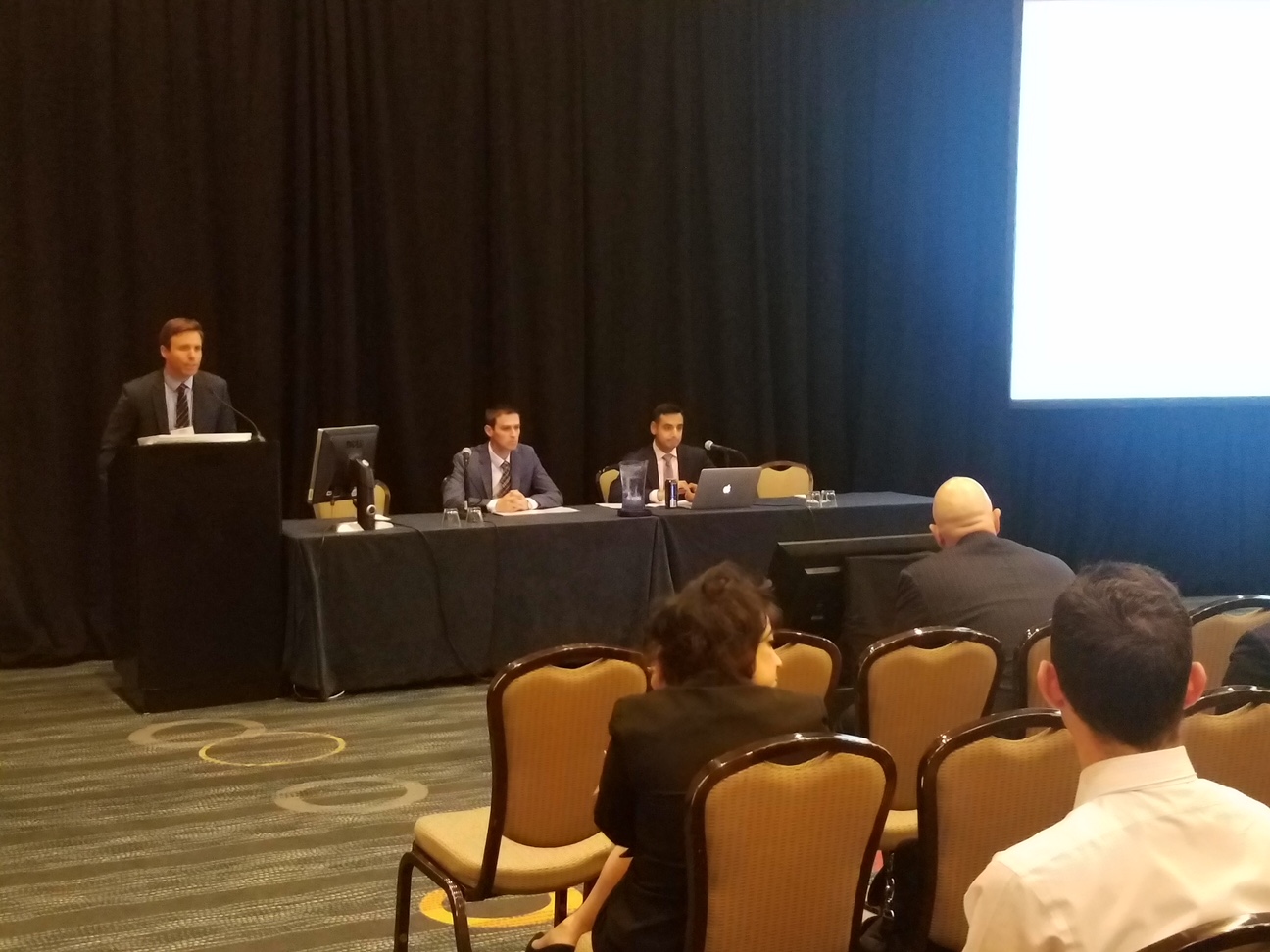
Congratulations to Colin Sperling, a fourth year med student at CMSRU, for his poster presentation on October 4, 2018, during the MA-AUA Annual Meeting in Washington, DC. The poster was titled “Evaluation of Escherichia coli Resistance to Fluoroquinolones in Men Undergoing Prostate Procedures: It’s Time to Change Preoperative Prophylaxis”.
MP2-11 – Evaluation of Escherichia coli Resistance to Fluoroquinolones in Men Undergoing Prostate Procedures: It’s Time to Change Preoperative Prophylaxis
Poster Presenter(s): Colin Sperling, Medical Student, Cooper Medical School of Rowan University
Author(s):
- Lucia Rosé, PharmD, Clinical Pharmacy Specialist, Infectious Diseases, Cooper University Hospital Department of Pharmacy
- Hailiu Yang, MD, Resident Physician, Cooper University Hospital, Department of Surgery, Division of Urology
- Dana Byrne, MD, Assistant Professor of Medicine, Cooper University Hospital Department of Medicine, Division of Infectious Diseases
- Henry Fraimow, MD, Associate Professor of Medicine, Cooper University Hospital Department of Medicine, Division of Infectious Diseases
- Jeffrey Tomaszewski, MD, Assistant Professor; Director of Genitourinary Oncology, Cooper University Hospital Department of Surgery, Division of Urology
- Allen Seftel, MD, Chief, Division of Urology, Cooper University Hospital Department of Surgery, Division of Urology
Introduction & Objective :
The AUA recommends fluoroquinolones (FQ) as primary perioperative prophylaxis for many urologic procedures. However, the Infectious Disease Society of America (IDSA) recommends avoiding empiric FQ use in genitourinary (GU) infections due to rising Gram-negative resistance. In particular, FQ resistance to the most common GU pathogen, E. coli, has reached 50% in some U.S. regions. While our hospital reports ~ 30% FQ resistance to E. coli, we are unsure of the generalizability in men undergoing prostate procedures. Many institutions, including ours, have used FQ perioperatively due to lack of data supporting alternative agents. We aimed to evaluate FQ resistance among E. coli isolates in this population at Cooper University Hospital. We assessed E. coli as a marker of presence or absence of resistant genitourinary flora.
Methods :
We utilized TheraDoc® to retrospectively review men > 18 years of age who underwent a primary prostate procedure between January 2014 and December 2017. All patients had a positive E. coli isolate from urine or blood within 12 months of the procedure. We excluded patients who underwent more than one prostate procedure. EPIC® was utilized for chart review. The primary endpoint was the prevalence of FQ resistant E. coli in men undergoing prostate procedures. This study was approved by the IRB on December 19, 2017 as a performance improvement project.
Results :
Fifty-seven men met criteria for chart evaluation. The most common procedure identified was radical prostatectomy (44%), followed by prostate photovaporization (23%). Preoperative antibiotics were administered to all patients and most received a single agent. Cefazolin or FQ were administered to 49% and 26%, respectively. Of 57 E. coli isolates, 31/57 (54%) were FQ resistant; while 8/57 (14%) were ceftriaxone resistant. Rates of FQ resistant E. colifrom the hospital antibiogram (32%) were significantly lower than our study population (54%) (P=0.0010). Forty-one patients (72%) received prior FQ within 1 year of the procedure. FQ resistance was significantly associated with prior FQ usage (P=0.0091).
Conclusions :
FQ resistance to E. coli was unacceptably high (53%) in this urologic population. If pre-procedure culture data are unavailable, an alternative agent such as ceftriaxone should be considered for trans-urethral or trans-rectal prostate procedures. 1st generation cephalosporins remain 1stchoice for radical prostatectomy. Based on our internal data, we now currently recommend ceftriaxone for prostate biopsy and prostate resection. Lastly, whole hospital antibiograms may not be reliable to predict resistance in this patient population.

Leave a Reply